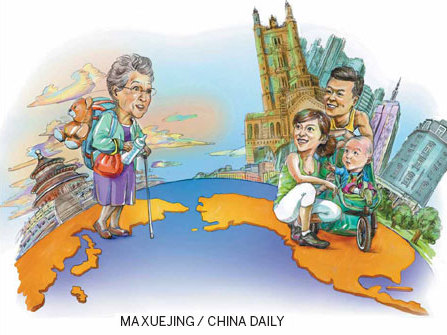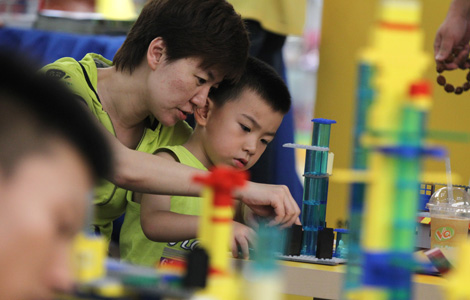Families feel the pull of 'gravity'
Updated: 2013-07-22 08:21
By Yu Ran (China Daily)
|
||||||||


More Chinese parents moving overseas to be with children, Yu Ran reports in Shanghai.
An increasing number of young Chinese who left home to study in overseas universities have decided to settle in their host countries. They have secured good jobs, married and are raising families. Now many are urging their parents to join them.
Liang Lixia, a 55-year-old retiree from Shijiazhuang, Hebei province, has been living for three years with her daughter, son-in-law and granddaughter in a large, three-story house in Auckland, New Zealand.
"My daughter chose to stay in New Zealand after graduation. My husband and I respected her decision and have tried to make her life easier by moving here to live with the family," said Liang, who has been granted permanent residence in New Zealand after being sponsored by her daughter, an accountant at a local company.
The country's parental "Center of Gravity" regulations mean parents can be sponsored for residency if "the principal applicant parent has no dependent children, and the number of their adult children lawfully and permanently in New Zealand is equal to or greater than those lawfully and permanently in any other single country", according to the website of Immigration New Zealand.
"I came here to take care of the 4-year-old and make sure that my daughter and son-in-law have more time and energy to earn money for the family. That means I am just a babysitter for the moment," laughed Liang.
China has become New Zealand's largest source country for immigrants approved through the parental category, accounting for 47 percent of all immigrants in the country last year.
On average, 10.7 percent of immigrants to New Zealand were aged 50 or older in 2012. However, the number from China accounted for 39.9 percent of the total, meaning four in every 10 Chinese who gained permanent resident status in 2011 and 2012 were within that age group, according to the latest statistics from Immigration New Zealand.
"We applied for permanent residence simply to spend more time with my daughter and her young family," said Liang.
Her daughter began studying in New Zealand in 2002. She married a local man in 2008, two years after graduation, and gave birth to a baby girl a year later. When the little girl was 3-months-old, she was taken to China so Liang could look after her, leaving the parents free to devote themselves to their fledgling careers. Two years later, the girl was taken back to New Zealand to attend kindergarten.
Liang now spends her days in Auckland taking care of her granddaughter, cooking and keeping the large house spick and span.
"I also have time to drive around and take part in some of the activities of the nearby Chinese community. I am also trying to learn English," she said.
With regard to her future plans, she is unsure if she and her husband will continue to live with her daughter in their later years.
"Although the living environment is good in New Zealand, we would still prefer to spend our later years with friends and relatives back in China - it's where we belong, it's in our blood."
She added that they will probably return to live in China permanently in two or three years when their granddaughter begins primary school. After that, they will travel to New Zealand every year to spend a few months with the family.
Run for home
Zhou Zhifa has a similar story. After spending more than 10 years living in Italy, the 80-year-old insisted on returning to his hometown of Wenzhou in Zhejiang province.
"We were persuaded to move away from China to help my sons start a business overseas. It's now expanded and we've hired a number of local employees," said Zhou, who used to visit Wenzhou for about three months every year. However, he has reversed the process and now spends just three months a year in Italy.
Along with his wife, Zhou arrived in Milan in 1997 and helped their sons with their chain of stores, which sell Chinese-made clothing, accessories and souvenirs.
"Initially, we imagined ourselves staying in Italy permanently, even after our sons no longer needed our help in the company, but we later realized that not speaking Italian fluently meant we wouldn't fit into the local society and would be forced to stay at home and not go out much," said Zhou.
The return to Wenzhou has been therapeutic for Zhou, who said he enjoys strolling to a nearby park to play chess with old friends. Meanwhile, he regularly arranges short trips to the countryside so he and his wife can enjoy the cleaner air.
Many of the younger generation, usually the only child in the family, have tried persuading their parents to spend the autumn of their lives overseas.
"My parents sent me to Canada for further study after I graduated from the University of Leeds in the UK," said Yang Xixi, a 28-year-old financial consultant in Vancouver, who married a Canadian-Chinese man in 2012.
Since finding a job with a local company in 2009, Yang has asked her parents to live with her many times. She feels she has been away from them for too long.
"I think I am now able to let my parents enjoy their later years without the worry of making more money to provide me with a better life. Life would be complete if they could move here permanently," said Yang.
However, her parents are still busy running their logistics company in Shenyang, Liaoning province, and have refused to move away from China.
"I am planning to have a baby in the next year or two, and hopefully my parents will change their minds for the sake of their grandchild and we can enjoy a wonderful family reunion," she said.
According to experts, the desire is perfectly normal, especially for Chinese people who set great store in family unity, especially the younger generation whose only-child status may mean they miss the warmth of family life more keenly.
"Most of the elderly people who have applied to emigrate to countries such as Canada, the United States, Australia and New Zealand in the past two years are the parents of graduates who studied at universities overseas, and they have seen their children settle in the host country," said Zhang Yuehui, a Beijing-based immigration expert.
He added that the elderly outflow is the result of a trend that has seen an increasing number of young people choose to move abroad for study or work with the specific intention of staying in the host country permanently.
Aging population
However, some elderly parents are more than willing to emigrate and enjoy a quieter and more comfortable life.
"I bought my son a house in the US when he graduated from university and applied for a masters course so he would be able to find a better job there; we looked forward to living abroad when we were young," said Yan Keqin, a 58-year-old retired teacher from Hangzhou in Zhejiang province.
She added that she and her husband, a retired lawyer, have traveled overseas on many occasions and, therefore, are able to adapt to different cultures and lifestyles very quickly. They decided to accompany their son when he emigrated.
Now, Yan and her husband live a few blocks away from their son in Seattle. She spends most of her leisure time gardening, visiting libraries, shopping and cooking, in addition to going to her son's house every week for a family dinner.
"The living environment is much better here than in Hangzhou; it feels as though we are on a permanent vacation; everything seems full of sunshine and fresh air and we have plenty of time to do the things we really want to do," she said.
As a future trend, Zhang suggested that more elderly emigrants will come to realize that living overseas in their later years is a wise option.
"As the problem of China's rapidly aging population becomes more severe, more elderly people are planning to move overseas during the next decade. They want to go to countries that offer a more extensive healthcare system, a better-protected environment and a slower pace of life," he said.
Contact the author at yuran@chinadaily.com.cn
(China Daily USA 07/22/2013 page8)
Most Viewed
Editor's Picks

|

|

|

|

|

|
Today's Top News
Woman jailed in Dubai after reporting rape
Guangdong to probe airport bomber's allegations
Police meets GSK representative after scandal
US protests demand 'justice for Trayvon'
6.6-magnitude quake hits NW China
Minister rules out stimulus package
Top Chinese admiral to visit US this year
Victory improves Abe's hand
US Weekly

|

|














